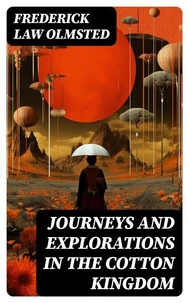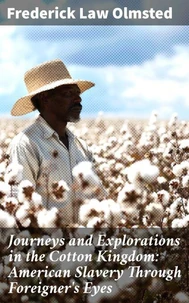The Truth of the Cotton Kingdom. Observations on Cotton and Slavery in the American Southern States
Par :Formats :
Disponible dans votre compte client Decitre ou Furet du Nord dès validation de votre commande. Le format ePub est :
- Compatible avec une lecture sur My Vivlio (smartphone, tablette, ordinateur)
- Compatible avec une lecture sur liseuses Vivlio
- Pour les liseuses autres que Vivlio, vous devez utiliser le logiciel Adobe Digital Edition. Non compatible avec la lecture sur les liseuses Kindle, Remarkable et Sony
 , qui est-ce ?
, qui est-ce ?Notre partenaire de plateforme de lecture numérique où vous retrouverez l'ensemble de vos ebooks gratuitement
Pour en savoir plus sur nos ebooks, consultez notre aide en ligne ici
- Nombre de pages273
- FormatePub
- ISBN859-65--4740178-0
- EAN8596547401780
- Date de parution13/11/2022
- Protection num.Digital Watermarking
- Taille690 Ko
- Infos supplémentairesepub
- ÉditeurDIGICAT
Résumé
In "The Truth of the Cotton Kingdom, " Frederick Law Olmsted delves into the complex socio-economic realities of the antebellum Southern United States, providing an in-depth analysis of the cotton industry and its profound implications for American society. Employing a blend of poignant observations, journalistic prose, and stark realism, Olmsted critiques the romanticized notions of Southern life, illuminating the stark disparities and moral confliction inherent in the plantation economy.
His meticulous fieldwork presents an empirical account of the local populace, agrarian practices, and the oppressive nature of slavery, making it an essential contribution to both literature and socio-economic discourse of the mid-19th century. An influential figure known primarily for his work as a landscape architect, Olmsted's foray into social criticism stems from his firsthand experiences during his travels in the South.
His advocacy for social justice and his keen observations of the intricate interplay between environment and society significantly informed his beliefs about the essential moral contradictions posed by slavery and capitalism. These perspectives are crucial to understanding the context in which he wrote this seminal work. Readers seeking a nuanced understanding of America's historical landscape, particularly the implications of its cotton economy, will find "The Truth of the Cotton Kingdom" revealing and transformative.
Olmsted's deft synthesis of journalism and social analysis invites exploration of themes that remain relevant today, making this book a vital read for students of history, sociology, and American literature alike.
His meticulous fieldwork presents an empirical account of the local populace, agrarian practices, and the oppressive nature of slavery, making it an essential contribution to both literature and socio-economic discourse of the mid-19th century. An influential figure known primarily for his work as a landscape architect, Olmsted's foray into social criticism stems from his firsthand experiences during his travels in the South.
His advocacy for social justice and his keen observations of the intricate interplay between environment and society significantly informed his beliefs about the essential moral contradictions posed by slavery and capitalism. These perspectives are crucial to understanding the context in which he wrote this seminal work. Readers seeking a nuanced understanding of America's historical landscape, particularly the implications of its cotton economy, will find "The Truth of the Cotton Kingdom" revealing and transformative.
Olmsted's deft synthesis of journalism and social analysis invites exploration of themes that remain relevant today, making this book a vital read for students of history, sociology, and American literature alike.
In "The Truth of the Cotton Kingdom, " Frederick Law Olmsted delves into the complex socio-economic realities of the antebellum Southern United States, providing an in-depth analysis of the cotton industry and its profound implications for American society. Employing a blend of poignant observations, journalistic prose, and stark realism, Olmsted critiques the romanticized notions of Southern life, illuminating the stark disparities and moral confliction inherent in the plantation economy.
His meticulous fieldwork presents an empirical account of the local populace, agrarian practices, and the oppressive nature of slavery, making it an essential contribution to both literature and socio-economic discourse of the mid-19th century. An influential figure known primarily for his work as a landscape architect, Olmsted's foray into social criticism stems from his firsthand experiences during his travels in the South.
His advocacy for social justice and his keen observations of the intricate interplay between environment and society significantly informed his beliefs about the essential moral contradictions posed by slavery and capitalism. These perspectives are crucial to understanding the context in which he wrote this seminal work. Readers seeking a nuanced understanding of America's historical landscape, particularly the implications of its cotton economy, will find "The Truth of the Cotton Kingdom" revealing and transformative.
Olmsted's deft synthesis of journalism and social analysis invites exploration of themes that remain relevant today, making this book a vital read for students of history, sociology, and American literature alike.
His meticulous fieldwork presents an empirical account of the local populace, agrarian practices, and the oppressive nature of slavery, making it an essential contribution to both literature and socio-economic discourse of the mid-19th century. An influential figure known primarily for his work as a landscape architect, Olmsted's foray into social criticism stems from his firsthand experiences during his travels in the South.
His advocacy for social justice and his keen observations of the intricate interplay between environment and society significantly informed his beliefs about the essential moral contradictions posed by slavery and capitalism. These perspectives are crucial to understanding the context in which he wrote this seminal work. Readers seeking a nuanced understanding of America's historical landscape, particularly the implications of its cotton economy, will find "The Truth of the Cotton Kingdom" revealing and transformative.
Olmsted's deft synthesis of journalism and social analysis invites exploration of themes that remain relevant today, making this book a vital read for students of history, sociology, and American literature alike.





